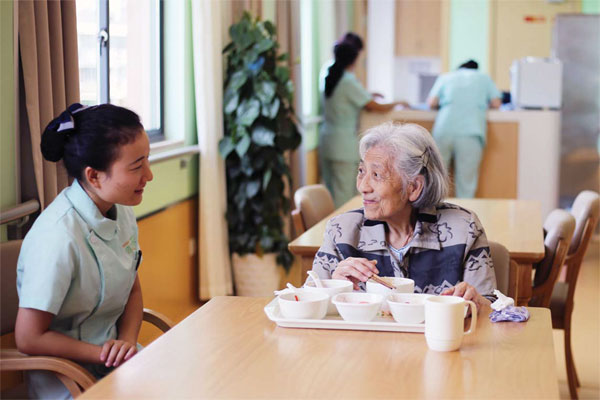Basic eldercare is a government obligation
 |
|
An elderly woman dines at a nursing home in Hangzhou.[Sun Yidou / For China Daily] |
THE STATE COUNCIL, China's Cabinet, recently issued guidelines on care services for the elderly. Based on the needs of senior citizens, the document sets out principles for the eldercare industry, as well as the welfare the elderly should enjoy, ranging from basic services, public facilities, to health and cultural services. Beijing Youth Daily comments:
By the end of 2015, China's empty nest elderly exceeded 110 million people, and by 2050 the total number of the elderly in the country is expected to reach 500 million, close to the total population of all the countries in Europe.
Some of the measures the document lists, if implemented, will help senior citizens a lot. For example, it said that all the elderly from poor families will get a minimum living allowance, while everyone aged 65 or above will get a free health examination every year.
Extending a helping hand to the aged, especially the poorest, has hit the nail on the head, because poor senior citizens are the most vulnerable group.
How to turn the welfare on paper into reality will depend on local governments increasing their investments into the social security system. In plain words, it is a question of money.
As early as September 2013, the State Council issued a document on further supporting the eldercare industry with tax incentives, more land supply, and the training of personnel.
However, four years have passed and the domestic eldercare industry is still in its early stage of development because the investment in it by local governments varies.
This time, in order to better implement the policy, local governments should give up thinking of making money from helping the aged, because the public eldercare sector hardly makes a profit and that is not its purpose. Even in the northern European countries where the eldercare industry is quite mature, local governments hardly make any money from it, and they have to invest hugely in it.
Of course, it is illusive to wholly depend on governmental investment, because that increases the financial burden on taxpayers and might be unsustainable in the long run. That is a problem not only for China, but also for the developed world, where doubts over high welfare have been increasing.
While local governments invest more in care for the aged, it is also necessary to encourage private companies to provide eldercare services and facilities.
























